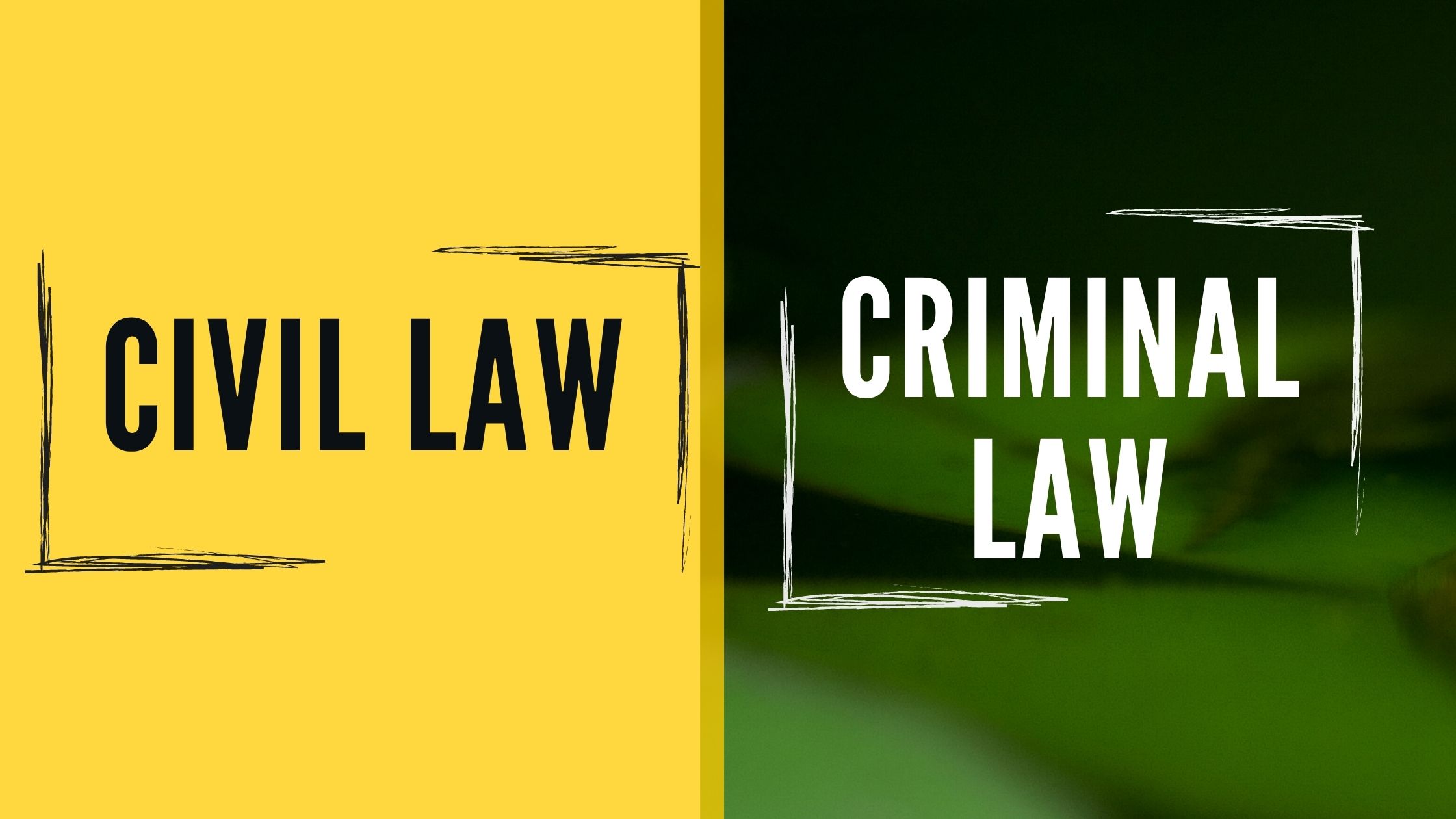
Law is a set of legitimate rules statutes and Judicial decisions that are applicable within a prescribed jurisdiction. The utmost purpose of law is to deliver justice to the victim and maintainthe order in society.There are various kinds of law in legal system. Each types of law comprised some rules and regulations that control and regulate the offense and infringement of the rights vested in others.In broadly speaking civil law and criminal law are two broad and separate entities of law with separate sets of rules and punishments whose aim is to deter, punish to the wrongdoer and compensate the victim. These two branch of law cover different areas of wrongs. Civil law deals with the civil wrongs i.e. injury to an individual or a private party such as a corporation where the rights of an individual or organization has been violated such as defamation (including libel and slander), trespass, battery, breach of contract, negligence result in injury or death, nuisanceetc. whereas the criminal law also called as Penal law cope with the wrongs that are criminal in nature i.e. criminal wrongs in general parlance we can say such wrongs that can be offensive for the public and society at large such as attempts to murder, theft,robbery, arson, assault, kidnapping and so on. These two branch of law vary from each other in sense of what is procedure for the commencement of cases ( who may bring a charges and file a suit) , what is nature of penalty and punishments that imposed, what slandered of proofs are required in separate trials etc. So civil law deals with disputes between one individual or organization and another. The guidelines for these disputes are outlined in official documents just like the Business and Professions Code, the Health and Safety Code and other governmental rules and regulations. The explanation for action in these cases are often initiated by individuals or the private party also. On the contrary of this Criminal law,deals with an individual’s offenses against the state or federal at large. It may sound literal—like someone assaulting a government official—but an offense against the state essentially means breaking a legal draft established by government. Basically these two branches of law defers in sense of usage of codes and statutes used in the trials of each. On this way we can distinguish both the laws on some basic essentials:
Procedure for the commencement of cases
In civil law the aggrieved party has need to file a case in the court or tribunals to start a case. Whereas in the criminal law the to commencement a case can not be filled directly in the court rather the plaintiff need to register a case with police first and then police will investigate of the concern case as well. Thereafter the case can be filled in the court accordingly. In the civil law its a party or an organization or corporation that initiates a case whereas in criminal law it’s sate that initiate a case.
Burden of proof
In civil law the burden of proof is upon the plaintiff to prove that the defendant has committed the same wrong but sometimes this burden also shifted to the defendant to respond by refusing all the allegations imposed upon him/her, thus the burden shifts to the defendant to defend and counterclaim. The proof which is required here that is balance of probabilities/preponderance of evidence that means if the plaintiff is capable to constitute more than 50 percent proof against the defendant then defendant would be held liable. And in criminal law it is the prosecution/state upon whom the burden of proof lies and here the proof that is required is beyond reasonable doubt means state has to prove 99 percent evidences against the defendant that he/she has committed the particular crime. The defendant presumed innocent until and unless Prosecutor fulfil the criteria of test of beyond reasonable doubt.
Read: LAW : Not Just a Profession But a Way of Life
Penalty and remedy
In civil law the Penalty is always in the form of compensation to the victim by the wrongdoer. This amount of compensation may be pre-decide or may decide at the time of finalization of case in court which is called punitive damage. Apart from the compensation sometimes the remedy also changes into some other forms and may be much better than compensation like injunction in the case of nuisance and so on. In civil law the wrongdoer either may consider as liable or not liable. On the contrary of this in criminal law the Penalty is always in the form of incarceration and fine and sometimes it be extended to the death penalty too as per the seriousness of the crimes. In criminal law the defendant is usually to be considered guilty or not guilty by the court. So basically the nature of crime is more dangerous than that of civil case one.
Objectives of the both laws
The very much Objectives of civil law is to protect and patronize the legal private rights of the individual or the organization and make sure that if the legal private rights of the individual or the organization has get violated then the wrongdoer must be liable to compensate the victim according to the damage suffered by the plaintiff. Thus the basic purpose of the civil law is to vindicate the rights of people or organizations. On the other hand the objective of criminal law is to punish the wrongdoer for his crimes and protect the society. So the criminal law aims at to maintain and secure the law and order in society at large.
Liability in association
In civil law one who has not done any wrong directly but is associated somehow with the wrong may be held liable for the wrong too. Like in civil law through the vicarious liability if an employee who does any wrong in he course of employment then the master of employee will be held liable, this Example also referred to as respondent superior means ultimate liability lies upon the superior. While in criminal law it’s one who actually committed crime will be liable for that itself.
Applicability of Double jeopardy
The Indian constitution In part III under Article 20(2) comprise the concept of “autrefois convict” or Double jeopardy which means that a person who is convicted must not be punished twice for that same wrongs. It means if a person is convicted for a crime the government can not file a case again once he/she is acquitted. And if the person is punished twice it’s called as Double jeopardy.
The applicability of this concept is only in criminal cases this is why one can use civil lawsuit again despite of this fact that whether once a personhas been convicted for the crime or acquitted.
Conclusion
Thus the civil law and criminal law defers from each other on a great scale. Keeping in mind the above discussion civil law is nothing but to a forum to vindicated of individuals as well as organization’s legal status. The term civil law is derived from the Latin term “jus Civili” which means that it is a law of civitasi.e. law of state. Sometimes it is also termed as Municipal law. In medieval period jurist used to say or as jus positivummeans positive law established by the human being in contrast of the law of nature. The basic principles upon which civil law is based that is “ubi jus ibi remedium”means where there is right there is a remedy.Civil law comprised various aspectssuch as tort law, contract law, intellectual property law, environmental, trade law , family law etc.
Other contrary of the civil law the criminal law also known as Penal law deals with the acts that intended to harm the individual or society at large. In common parlance the criminal law deals with the offences against the state. In other words crime is the breach of duty towards the public as a whole and foe which the wrongdoer get a punishment by the state. The objective of the criminal law is to punish the wrongdoer and abstain him/her from committing it again in future. The basic principle upon which criminal law is based that “actus non facit reum, nisi mens sit rea” which means that to constitute a crime its necessary to the individual have guilty intention while committing that act. Similarly only guilty mind doesn’t constitute a crime unless it doesn’t accompanied with wrongful act of wrongdoer. For example a person I’s thinking about for a kidnapping then it does not entitled him/her a kidnapper until and unless he/she did so on practical level. And if a person strikes another but without the guilty intention then he would not be a assault. Criminal law majorly have two kinds of laws viz. Substantive law and procedural law. Substantive law prescribe the punishment while procedural law tells about the procedure of infliction of that penalty. The criminal law is codified in IPC 1860, Cr.P.C. 1973, India Evidence Act 1872 etc. So overall civil law aims at to settle the disputes in simple way while the criminal law does the same on rigorous method. So overall the criminal law is much harsh and strong than that of civil law.
By: Farhan khan


